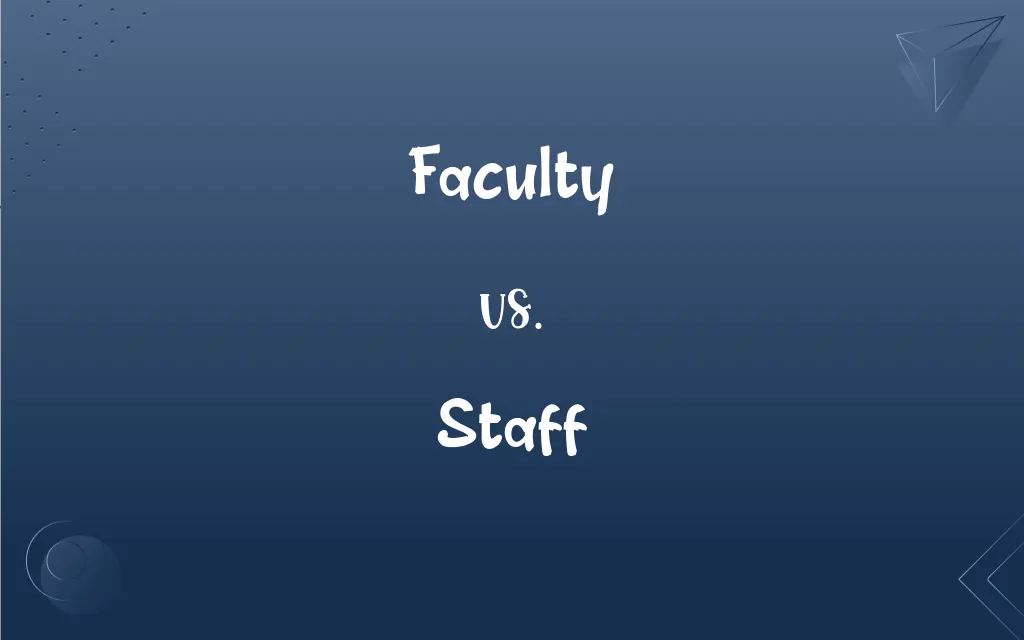Faculty vs. Staff: What's the Difference?
Edited by Janet White || By Harlon Moss || Updated on October 14, 2023
Faculty generally refers to academic staff like professors, while staff pertains to all employees in an institution, including administrative personnel. Both are vital in running educational entities but differ in roles.

Key Differences
Navigating through the academic arena, faculty is often recognized as a collective term for educators, such as professors, lecturers, and researchers, enriching students academically. On the contrary, staff casts a wider net, encapsulating everyone employed within an institution, be it in academic, administrative, or supportive roles. The roles of both faculty and staff intertwine yet remain distinctly categorized, each providing a vital cog in the academic machine.
Delving deeper into the realm of faculty, their primary role revolves around imparting education, conducting research, and potentially influencing academic policy. Staff, however, traverses a broader spectrum of responsibilities, ensuring the smooth operation of the institution through administrative, managerial, and maintenance roles. Thus, faculty and staff coexist, providing educational and infrastructural stability to an institution, respectively.
In terms of hierarchical structures, faculty members often find themselves bound to academic rankings, progressing from assistant to associate professors, and potentially, to tenured positions. Staff, however, encompasses a myriad of positions, from administrative officers to maintenance workers, each operating in their designated department. The hierarchy within faculty and staff differs but both collectively contribute to an organized, functioning institution.
Examining interactions with students, faculty predominantly engage in classrooms, laboratories, and research endeavors, shaping academic journeys. Staff, however, may interact with students across various facets, from administrative dealings, such as enrollment and fee payments, to ensuring a conducive learning environment. The nuances between faculty and staff, while subtle, carve out the multifaceted functionality of academic institutions.
Within professional development, faculty may often plunge into deeper academic explorations, perhaps publishing research or attending conferences. Staff may explore development through advancing administrative skills, attending workshops relevant to their role, or potentially ascending through administrative ranks. The professional journeys of faculty and staff diverge and intersect at various junctures, collectively nurturing the growth and evolution of the academic entity they serve.
ADVERTISEMENT
Comparison Chart
Word Length
7 letters
5 letters
Syllables
2 syllables
1 syllable
First Letter
F
S
Vowels
3 vowels
1 vowel
Usage in Context
Primarily academic
Broad organizational use
ADVERTISEMENT
Faculty and Staff Definitions
Faculty
Faculty refers to the educators and academic researchers within an institution.
The faculty members gathered to discuss the new curriculum.
Staff
Staff may also refer to a long, strong stick used for support in walking or hiking.
He leaned on his staff as he navigated the steep hillside.
Faculty
Faculty can also denote a division within a university, grouping related academic disciplines.
She joined the Faculty of Science to pursue her passion for biology.
Staff
In music, a staff is a set of five horizontal lines and four spaces used to record musical notation.
The melody was beautifully transcribed onto the staff.
Faculty
Faculty often involves individuals holding professorial ranks, engaged in teaching and research.
The faculty of the university were highly esteemed for their research contributions.
Staff
Staff encompasses all individuals employed by an organization.
The staff at the hospital worked tirelessly throughout the pandemic.
Faculty
Faculty is tasked with shaping academic policies, courses, and research directions.
Faculty meetings often involve discussions about improving academic programs.
Staff
To staff means to provide a place, organization, or event with workers.
They needed to staff the event adequately to manage the large crowd expected.
Faculty
Faculty can also refer to a collective capability or power of a being, such as mental faculty.
His mental faculties were sharp, even in his advanced age.
Staff
Staff can denote a group providing backstage or logistical support at events or shows.
The concert staff ensured that the event ran smoothly from start to finish.
Faculty
An inherent power or ability
The faculty of speech.
Staff
A stick or cane carried as an aid in walking or climbing.
Faculty
A talent or natural ability for something
Has a wonderful faculty for storytelling.
Staff
A stout stick used as a weapon; a cudgel.
FAQs
What roles do general staff members undertake in an institution?
Staff members handle administrative, operational, and supportive roles within an institution.
What does faculty generally focus on within universities?
Faculty usually focuses on teaching, research, and furthering academic goals within universities.
Can a staff member teach courses like faculty?
Typically no, but staff members may teach if they possess the requisite qualifications and approvals.
Do faculty members belong to the staff of a university?
Yes, faculty members are a specialized segment of a university's staff focused on academic roles.
Can faculty members be part of administrative decision-making?
Yes, faculty members often partake in committees and boards influencing academic policies.
Do all staff members interact with students?
Not all, but many staff members interact with students in various capacities, such as administration or support.
What does the faculty of a particular field (e.g., Faculty of Science) denote?
A Faculty (e.g., Science) groups related academic departments and disciplines within a university.
Do faculty members contribute to a university’s reputation?
Yes, the achievements and renown of faculty members significantly influence a university’s reputation.
Can staff members hold Ph.D. degrees like faculty?
Yes, staff members may hold Ph.D. degrees, especially if they're involved in specialized research or technical roles.
Can staff members transition into faculty roles?
Staff members can transition into faculty roles if they acquire the necessary academic qualifications and experience.
Can staff members be involved in organizational strategy?
Yes, certain staff members, especially in managerial roles, contribute to shaping organizational strategy.
What are the qualifications generally required for faculty positions?
Faculty positions generally require advanced degrees, typically a Ph.D., and relevant academic expertise.
Is the term staff limited to educational contexts?
No, "staff" refers to all employees in any organizational context, not just educational ones.
What is a typical career path for faculty members?
Faculty members may progress from assistant professors to associate and then full professors, potentially gaining tenure.
Is faculty involved in the hiring process of their peers?
Yes, faculty often participate in hiring committees for new faculty members.
Is the term faculty used outside of educational contexts?
Rarely, "faculty" is primarily used in educational contexts, though might be used to describe a group with specific skills elsewhere.
How is the staff involved in ensuring university operations?
Staff ensure university operations by managing administration, maintenance, finance, and other non-academic facets.
Can faculty members hold administrative positions?
Yes, faculty members can hold administrative positions, such as deans or department heads.
What might a staff member in a university’s admissions office do?
An admissions staff member may manage applications, communicate with applicants, and organize admissions events.
Is tenure ever awarded to staff members in a university?
Tenure is typically reserved for faculty members, though some institutions might have long-term positions for staff.
About Author
Written by
Harlon MossHarlon is a seasoned quality moderator and accomplished content writer for Difference Wiki. An alumnus of the prestigious University of California, he earned his degree in Computer Science. Leveraging his academic background, Harlon brings a meticulous and informed perspective to his work, ensuring content accuracy and excellence.
Edited by
Janet WhiteJanet White has been an esteemed writer and blogger for Difference Wiki. Holding a Master's degree in Science and Medical Journalism from the prestigious Boston University, she has consistently demonstrated her expertise and passion for her field. When she's not immersed in her work, Janet relishes her time exercising, delving into a good book, and cherishing moments with friends and family.































































